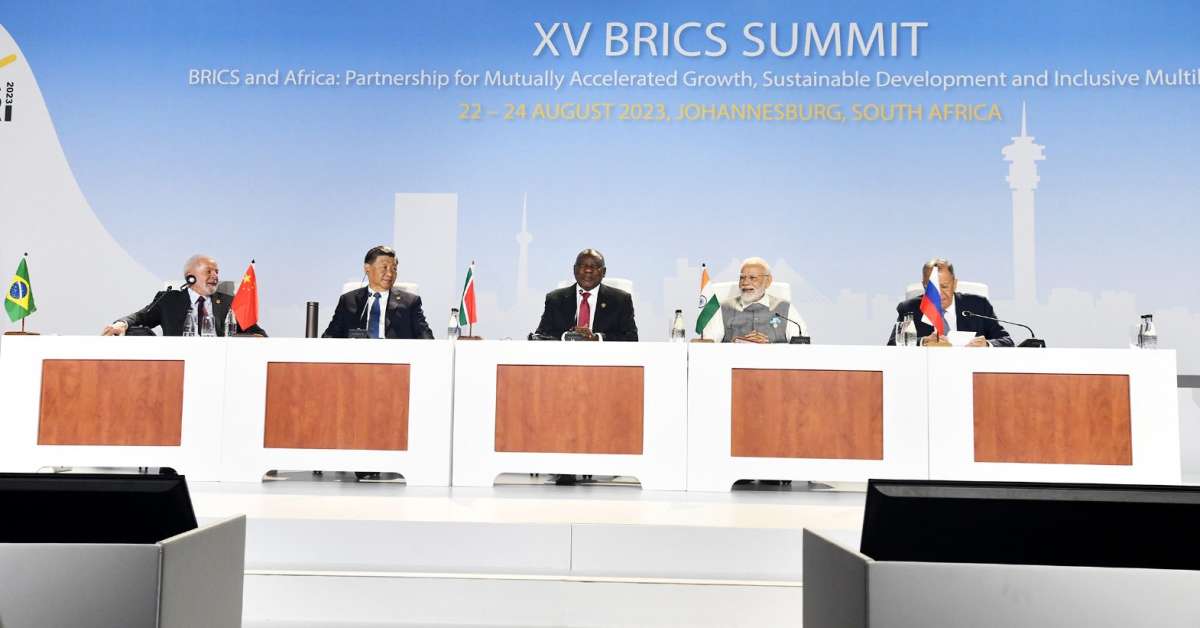When selecting new members, the bloc may have taken into consideration the pricing of energy products, and how their countries can reduce their liability and vulnerability in terms of the cost of oil…reports Asian Lite News
By doubling its number of members, from five to eleven in one quick sweep, the BRICS grouping has strengthened its position as a global grouping to be reckoned with. In addition, the choice of countries, bringing in four major players from the ‘Middle East region’: Egypt, Iran, Saudi Arabia and UAE, apart from Ethiopia and Argentina from Africa and South America, is significant, as it denotes a shift in the non-western economic grouping’s underpinnings, to make it a more politically relevant bloc.
Chief amongst the messages the BRICS has sent out is that despite misgivings and even mockery of the cohesion in the grouping in the west, it is an attractive club for members of the Global South. BRICS founders chose from 22 countries that formally applied for BRICS membership, and more than 40 in all that have evinced interest in the group. The message that the summit and the BRICS expansion took place despite the US and Europe’s moves to “isolate” Russia over its invasion of Ukraine, and to push for an ICC international warrant that prevented Russian President Vladimir Putin from travelling to Johannesburg would not be lost on the Western bloc either.
While India may not have been in favour of such a rapid expansion, officials have said it took the lead in drafting the criteria for membership, and the fact that most of the new members are strategic partners of India is the result of India’s efforts. The induction of Iran in BRICS sends a further message against US sanctions, just as Iran’s induction in the SCO this year did, and it is significant that Prime Minister Narendra Modi spoke to Iranian President Ebrahim Raisi before the summit and met him on the sidelines of the summit.
However, many international observers have pointed out that all the new members have very close economic ties to China, and the acceptance of Iran and Saudi-UAE to the same grouping has only been made possible by the peace deal brokered by Beijing earlier this year. This factor means that in the future, India may have to lobby harder to make its vote in the BRICS grouping count.
Briefing the media, Foreign Secretary Vinay Kwatra said the BRICS expansion would also bolster India’s push for UN reform, more representation of the global south and the expansion of the UN Security Council.
Another significant message is the induction of major energy players to the grouping, that is working on a plan for the use of national currencies for, six of the world’s top 10 oil producers will now be members of the BRICS, including Saudi Arabia, Russia, China, UAE, Brazil and Iran.
“Now that we are joined by such major players in the energy market as Saudi Arabia, Iran, the United Arab Emirates, of course, the topic of energy will shine in a new light and will be in great demand,” Russian Foreign Minister Sergey Lavrov said in a press conference after the summit ended, where he also clarified that the name of “BRICS” will not be changed as it now represents a recognised global “brand”.
Calling the induction of the UAE to BRICS as an “important milestone”, UAE’s Ambassador to India Abdulnasser Alshaali said, “For UAE-India relations, this is an opportunity to continue broadening and deepening our strategic cooperation and economic partnership.”
“It is hard to find commonalities among the six countries invited to join BRICS other than that they are each significant states in their region,” Danny Bradlow, a professor with the Centre for the Advancement of Scholarship at the University of Pretoria, told Al Jazeera.
With the inclusion of Saudi Arabia, Iran, UAE and Egypt, “you could argue it’s very Middle East centric”, according to Sanusha Naidu, a senior research fellow at the Institute for Global Dialogue, a South African think tank focusing on China and Africa.
“This has geo-economic, geostrategic and geopolitical implications,” Naidu argued, saying the latest additions will push some BRICS nations to think more about their Middle East policies, and for China and India to beef the existing policies.
China recently brokered the re-establishment of ties between Saudi Arabia and Iran, a role that would traditionally have been filled by a country like the United States. India’s recently signed an agreement with the UAE to trade in Indian rupees and Emirati dirhams instead of in the US dollar.
When selecting new members, the bloc may have taken into consideration the pricing of energy products, and how their countries can reduce their liability and vulnerability in terms of the cost of oil, she said.
“Besides Russia, all of [the core BRICS countries] are non-energy producing countries. They need to be able to make their economies function, but they don’t want to get caught in the secondary collateral damage of sanctions,” she explained.
The use of “unilateral sanctions” against countries and the continued dominance of the US dollar in global trade is something BRICS has vocally challenged.
The expansion “opens up new avenues for trade”, said Karin Costa Vasquez, a non-resident senior fellow at the Center for China and Globalization in Beijing.
ALSO READ-BRICS Summit Success Celebrated by South African Parliament

Leave a Reply